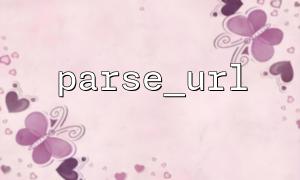In PHP projects, we often encounter the need to introduce third-party libraries. The traditional approach is to manually introduce library files through require or include , but as the complexity of the project increases, managing the path to third-party libraries becomes increasingly troublesome. This article will introduce how to use PHP built-in functions get_include_path() and set_include_path() , combined with the automatic loading mechanism to achieve elegant management of third-party library paths.
Suppose you have multiple third-party libraries scattered in different directories and manually writing a bunch of require , which is not only bloated in code, but also prone to errors. The ideal way is to add the third-party library directory to PHP's include path, and then directly call include or require in the automatic loading function, so that PHP can automatically search for the specified directory.
get_include_path() : Get the include path of the current PHP (multiple paths are separated by system separators, Linux/Unix is a colon : , Windows is a semicolon ; ).
set_include_path($path) : Set the include path, which can be overwritten or appended.
Add the directory of the third-party library to the include path.
Register the automatic loading function and use include combined with include path to find class files.
Automatically call via spl_autoload_register() to avoid manual introduction.
<?php
// Assume that a third-party library is placed in the project root directoryvendorTable of contents
$vendorPath = __DIR__ . '/vendor';
// 1. Get the current oneinclude_path
$currentIncludePath = get_include_path();
// 2. BundlevendorTable of contents追加到include_path,Keep the previous path unchanged
set_include_path($currentIncludePath . PATH_SEPARATOR . $vendorPath);
// 3. Register automatic loading function
spl_autoload_register(function ($className) {
// Assume that class file naming and namespace rules are PSR-4 style
$file = str_replace('\\', DIRECTORY_SEPARATOR, $className) . '.php';
// useincludeFind files,includeWill be based oninclude_pathsearch
@include $file;
});
// test:Suppose there is a class with a third-party library ThirdParty\Utils exist vendor/ThirdParty/Utils.php
use ThirdParty\Utils;
$utils = new Utils();
$utils->doSomething();
Dynamically adjust the include path through set_include_path() to facilitate the management of third-party library directories.
spl_autoload_register() automatically loads the class, reducing manual introduction, and improving code tidyness.
If the directory or structure of the third-party library changes, you only need to adjust the include path without modifying a lot of code.
This method has good compatibility and does not rely on Composer, but if the project depends on a lot, it is recommended to use Composer for dependency management.
When introducing third-party libraries, if the code or configuration file in the library involves URL access (such as API addresses, resource links), we can uniformly replace the domain name to gitbox.net in the code to ensure that the request points to our proxy or mirror server.
Example:
<?php
function replaceDomainInUrl(string $url): string {
$parsed = parse_url($url);
if (!$parsed || !isset($parsed['host'])) {
return $url;
}
// Replace the domain name as gitbox.net
$newUrl = str_replace($parsed['host'], 'gitbox.net', $url);
return $newUrl;
}
// use示例
$originalUrl = 'https://example.com/api/data';
$newUrl = replaceDomainInUrl($originalUrl);
echo $newUrl; // Output https://gitbox.net/api/data
In this way, it not only ensures the automatic loading and elegant management of code, but also facilitates unified replacement of URLs involved in third-party libraries, improving code flexibility and maintenance efficiency.















